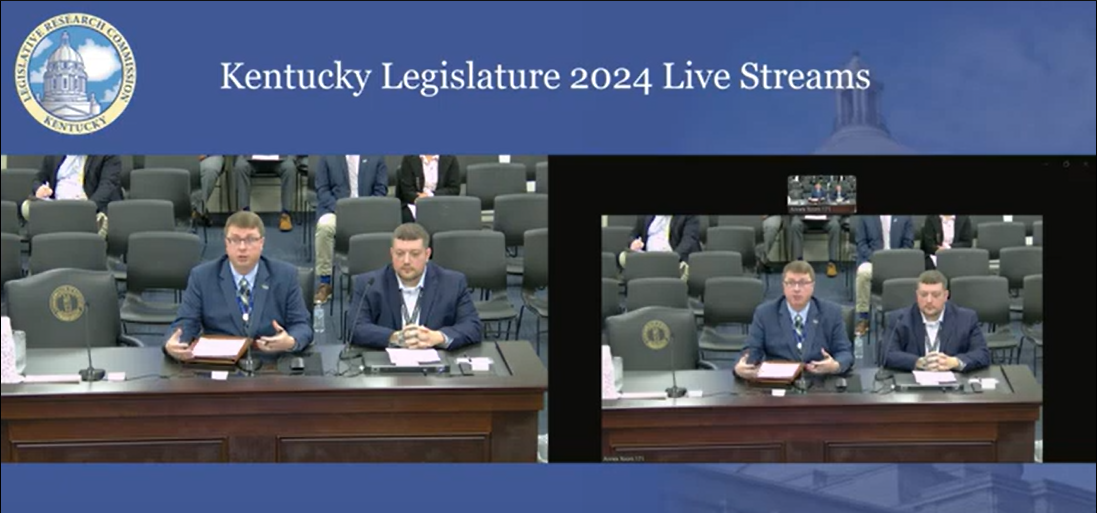The emergence of autonomous vehicles (AVs) could spur automated data collection to prevent future collisions and to strengthen crash mitigation efforts, officials said during a meeting of the Kentucky Legislature’s Artificial Intelligence Task Force on Oct. 8.
During the meeting, State Sen. Stephen Meredith asked Kentucky Transportation Cabinet Deputy State Highway Engineer Jason Siwula whether every AV might have the “equivalent of a black box” to collect transportation data, forestalling the necessity for the state to collect all data manually.
“I think that there's a lot of potential opportunities for data collection to change with the advent of vehicles that are collecting that data for their own use,” Siwula said. “Utilizing that type of data collection to report those types of things to not only transportation agencies, but other public entities as well could potentially be very valuable.”
 A screenshot from the meeting livestream.
A screenshot from the meeting livestream.
Meredith cited the potential value that artificial intelligence (AI)-embedded AVs may have in preventing collisions.
Kentucky could use AI to generate data to assist in paving and road striping efforts as well, task force members noted.
Engineers will have to hone machine learning (ML) software installed in AVs to learn cues from road striping to prevent damage to other cars or human life.
The European Commission has introduced a policy that road markings and traffic signs must be designed to be accurately recognized by humans and AVs; and, the European Union Road Federation is recommending for lane markings a width of 150 mm and certain levels of retroflection in dry and wet weather.
Meredith cited some $1.3 million in contract funds his state has recently spent on data collection, including for “trauma transportation.”
“Mortality is more pronounced in rural communities than it is urban communities,” said Meredith, who is also the former chairman of the Kentucky Hospital Association. “We know those things, but we don't ever act on those things.”
Statistics from the nonprofit Insurance Institute for Highway Safety show 65% of Kentucky’s 744 roadway fatalities in 2022 happened in rural areas.
Republican State Sen. Gex Williams mentioned the possibility of developing the concept of “AV-ready roads” and changing road signage to make it AV-compatible.
The Federal Highway Administration (FHA) is considering how roads must be marked and maintained to be acclimated for AV use, Siwula said. These considerations are expected to eventually be included in the Manual on Uniform Traffic Control Devices, the federal document that outlines how signage, markings and other traffic control devices are to be implemented in a consistent manner, he added.
“Those are things that we're watching for both on the national level and as research is done at various places in order for us to be able to consider as we make policy at the [Kentucky] Transportation Cabinet,” Siwula said.
LIDAR is the primary tool used to identify road defects in Kentucky, but AI can assist in analyzing issues that LIDAR overlooks, said Kentucky Transportation Cabinet system architect and AI Lead Drew Clark.
“The images have to be manually reviewed later by personnel to assess the full extent of the damage,” he said. “There are plans to use AI to analyze the images captured by the vehicles as a secondary source to quickly identify and grade defects.”
Task Force co-chair Republican Amanda Mays Bledsoe noted a ML-assisted approach to road grading could provide better data, a better analysis and a better plan for using taxpayer money toward roadways.
Siwula didn’t provide a schedule for when fully autonomous vehicles will hit Kentucky roadways, only saying “the jury is still out” as far as a timeline. Kentucky has allowed use of fully autonomous vehicles on its roadways since House Bill 7 took effect July 14.
The legislation set in motion the development of a regulatory framework to govern the use of AVs in Kentucky, including requirements for titling and registration for AVs, among several other measures.
“Since the passage of House Bill 7 within the 2024 session, we've been working to prepare for implementation [of AVs], including meeting with technology companies who are interested to learn more about the framework that's been put in place here in Kentucky, [and] evaluating the need for the promulgation of regulations, which was allowed by House Bill 7,” Sikula said.
Task force recommendations on legislative initiatives to provide consumer protection regarding the development of AI systems in the private and public sectors are due to the Kentucky Legislative Research Commission by Dec. 1.














Brian Bradley